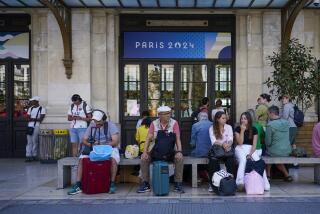Incidents stir fear of new strife in Paris suburbs
- Share via
PARIS — A year after the deaths of two teenagers here triggered weeks of arson and rioting, residents and authorities worry that disaffected youths are poised for a new cycle of violence.
In recent days, hoodlums set fire to four buses. Other incidents of arson and ambushes on police have accelerated in the last several weeks.
The attacks suggest that the anger and frustration of impoverished youths have yet to dissipate, and that measures by the French government have been insufficient, said people who work and live in the suburbs of Paris.
The conditions are ripe for a repetition of the mayhem that began Oct. 27, 2005.
“If someone were killed, that would set it off,” said Bruno Pommard, a retired SWAT officer who directs a nonprofit agency for children in CorbeilEssonnes and other volatile areas of France. “It’s simmering.”
The attacks Wednesday and Thursday on buses followed the same pattern: Young men, their faces partially masked, boarded buses, forced passengers off, doused the vehicles with gasoline and set them on fire. In one case the bus was empty. A bus also was torched over the weekend.
In a least one instance, the young men were armed. Even at the height of last year’s riots, it was rare to see anyone with a firearm.
“There is obviously a copycat phenomenon between these bus attacks,” said David Sukli, the director of public security in Seine-Saint-Denis, one of the suburbs where a bus was burned after midnight Thursday. “The media coverage of the first incident in Essonnes probably contributed to giving ideas to those youths.”
Last weekend, police were attacked in Aulnay-sous-Bois, one of the turbulent suburbs northeast of Paris.
Police had responded to an explosion, and 15 youths descended on them throwing stones and Molotov cocktails. A 17-year-old was arrested.
A few days earlier, an attack left one policeman in need of stitches.
It was a year ago today that two youths apparently trying to escape police were electrocuted when they ran into an electrical transformer station in Clichy-sous-Bois. The incident set off three weeks of violence that spread from the capital across France and resulted in thousands of cars burned and some shops vandalized.
Long-held resentment of the police and of French attitudes toward immigrants burst into the open. The majority of those rioting were the French-born children of immigrants from northern and sub-Saharan Africa, most of them Muslim.
There will be memorial events today in Clichy-sous-Bois to honor the two teens who died last year, and to allow people a forum to grieve and to discuss the community’s troubles. The French government has tried to improve job opportunities, and it has injected money into nonprofit organizations that work in destitute areas.
This year’s violence has been treated gingerly by politicians, who are in the early stages of an election campaign. The first round of the presidential election will be held April 22.
Last year, comments by Interior Minister Nicolas Sarkozy, who referred to hoodlums in the suburbs as racaille, which means rabble or thugs, became a rallying cry for angry youths.
On Thursday, the French government promised law and order, but also pledged a greater effort to improve the impoverished and isolated suburbs.
Prime Minister Dominique de Villepin said the recent attacks “should lead to an immediate response.”
“We cannot accept the unacceptable,” he told reporters in the northern suburb of Cergy-Pontoise. “There will be arrests.... That is our responsibility.”
He repeated the government’s insistence that law enforcement authorities rid France of areas where gangs operate with impunity.
But the prime minister said efforts should be directed to revitalize troubled neighborhoods.
Defense Minister Michele Alliot-Marie, considering a run for the presidency, said in a television interview that the attacks demonstrated “a desire to kill.”
“Some individuals are looking for provocations, and sometimes go further,” she said.
But she acknowledged that people facing unemployment and living in overcrowded housing projects had “trouble finding their place” in society.
Cars are regularly torched in France’s poor suburbs, but attacks on buses are rare.
In the first six months of this year, about 21,000 cars were burned and 2,882 attacks were reported against police, fire and ambulance services, the domestic intelligence agency Renseignements Generaux told French news agencies.
More to Read
Sign up for Essential California
The most important California stories and recommendations in your inbox every morning.
You may occasionally receive promotional content from the Los Angeles Times.













